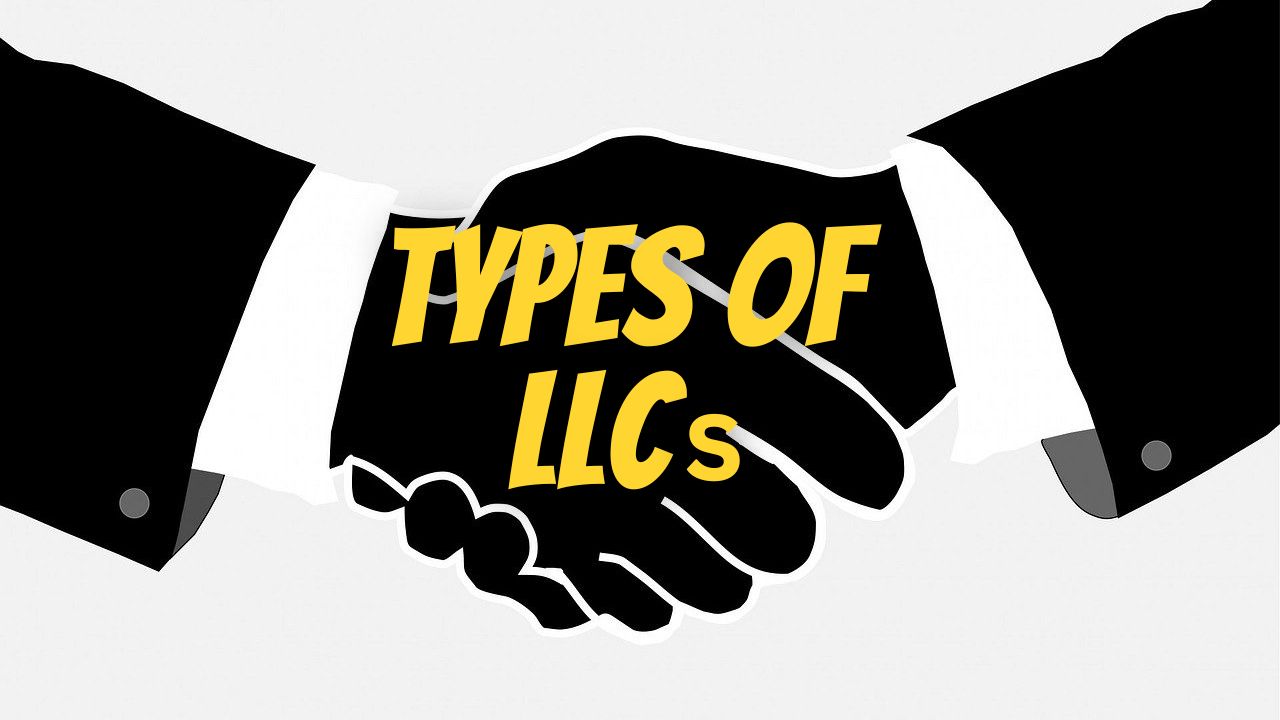What is an LLC?
An LLC (Limited Liability Company) is a flexible and popular legal business structure that combines the benefits of both partnerships and corporations. Here are the key points about LLCs:
1. Limited Liability:
Owners (referred to as “members”) are shielded from personal liability for the company’s debts and obligations. Their personal assets remain separate from the business.
2. Pass-Through Taxation:
LLCs enjoy pass-through taxation, meaning business income or losses flow through to the owners’ personal tax returns. This simplifies tax management.
3. Flexibility:
LLCs can be single-member (owned by one person) or multi-member (with multiple owners). They can also be member-managed (members collectively handle operations) or manager-managed (a third-party manager oversees operations).
Different types of Limited Liability Companies (LLCs)
There are several types of limited liability companies (LLCs) to consider when structuring your business. Here’s a comprehensive overview of the different types of Limited Liability Companies (LLCs):
1. Domestic LLC:
Domestic LLCs are the most common type of LLC. They are incorporated and operate within a single state.
These LLCs are subject to the specific laws and regulations of the state in which they are formed.
2. Foreign LLC:
A Foreign LLC is an LLC that operates in a state other than where it was originally formed.
If you want to expand your business to other states, you can register your Domestic LLC as a Foreign LLC in those states.
3. Professional LLC (PLLC):
PLLCs are designed for licensed professionals such as doctors, lawyers, accountants, and architects.
They offer limited liability protection to professionals while allowing them to practice their licensed profession.
4. Nonprofit LLC:
Nonprofit LLCs are formed for charitable, educational, or religious purposes.
Unlike traditional nonprofits, they have the flexibility of an LLC structure.
5. Low-Profit LLC (L3C):
L3Cs are a hybrid between a nonprofit and a for-profit entity.
They focus on achieving a social or charitable mission while still generating some profit.
6. Series LLC:
A Series LLC allows you to create separate “series” within the same LLC.
Each series can have its own assets, liabilities, and members, providing greater flexibility for managing different business ventures.
7. Anonymous LLC:
An Anonymous LLC is designed to protect the privacy of its owners.
Ownership information is not publicly disclosed, making it ideal for those who want to keep their identity confidential.
8. Restricted LLC:
Restricted LLCs have specific limitations on their activities or ownership.
These restrictions can be related to the type of business, location, or other factors.
Remember that the best type of LLC for your business depends on your specific needs, goals, and the state in which you operate. Consulting with legal and financial professionals is essential to make an informed decision. If you have any further questions, feel free to ask!
Choose the best structure based on your business needs and consult legal or financial professionals for personalized advice. 😊
In the world of business, limited liability companies (LLCs) have gained immense popularity due to their flexible structure and liability protection. Entrepreneurs and business owners often opt for LLCs to enjoy the benefits of both limited liability and pass-through taxation. However, not all LLCs are created equal.
Let’s delve into the various types of Limited Liability Companies (LLCs) and explore their distinct features. Whether you’re a budding entrepreneur or an established business owner, understanding these LLC structures can help you make informed decisions for your business.
Now, let’s explore other different types of LLCs:
1. Single-Member LLC (SMLLC):
- Owned by a single individual.
- Simple structure, ideal for solo entrepreneurs.
- Pass-through taxation.
- Personal liability protection.

A Single-Member LLC (SMLLC) is a business entity designed for individual entrepreneurs. Here are the key characteristics:
- Ownership: As the name suggests, it’s owned by one person, making it a popular choice for solo business owners.
- Liability Protection: The owner enjoys limited liability, meaning personal assets are protected from business debts and legal actions against the business.
- Taxation: It’s taxed as a disregarded entity by default, meaning profits and losses are reported on the owner’s personal tax return, avoiding double taxation.
- Flexibility: The SMLLC offers operational flexibility without the need for complex structures or agreements.
- Ease of Formation and Maintenance: It’s simpler to set up and maintain compared to corporations, with less paperwork and lower costs.
- Credibility: Operating as an SMLLC can enhance the business’s credibility with customers and potential investors compared to a sole proprietorship.
It’s important for the owner to maintain a clear separation between personal and business finances to uphold liability protection. Consulting with legal and financial advisors is recommended to ensure compliance with state-specific regulations and to explore if an SMLLC is the right structure for your business venture.
2. Multiple-Member LLC (MMLLC):
- Has two or more owners (members).
- Operates similarly to a partnership.
- Profits and losses are distributed based on ownership shares.
- Pass-through taxation.

A Multiple-Member LLC (MMLLC) is a business structure that allows for two or more individuals or entities to own a portion of the company. Here are the key features of an MMLLC:
- Ownership: There is no maximum limit on the number of members (owners) an MMLLC can have, making it a versatile option for businesses of various sizes.
- Limited Liability: Members enjoy protection from personal liability for the company’s debts and obligations, safeguarding their personal assets.
- Tax Flexibility: MMLLCs benefit from pass-through taxation, where profits and losses are reported on the members’ personal tax returns, avoiding the double taxation of corporations.
- Management: Members can manage the company directly or appoint managers. This allows for flexibility in how the business is operated, whether by member consensus or by designated managers.
- Profit Distribution: Profits are typically distributed according to each member’s ownership stake, but MMLLCs offer the flexibility to allocate profits differently if agreed upon in the operating agreement.
- Formation and Compliance: MMLLCs must register with the state, obtain a tax ID number, and may need specific licenses and permits depending on their industry or location.
An MMLLC is a popular choice for businesses that want the liability protection of a corporation with the tax benefits and operational flexibility of a partnership. It’s suitable for companies with multiple owners who bring diverse skills and resources to the business.
3. Manager-Managed LLC:
- A subset of members or an external manager handles day-to-day operations.
- It is useful when some members are passive investors.
- Provides flexibility in decision-making.
A Manager-Managed LLC is a type of Limited Liability Company where the management responsibilities are delegated to one or more appointed managers rather than the members (owners) themselves. Here’s a detailed description:
- Management Structure: In a manager-managed LLC, the managers are given the authority to make day-to-day decisions, enter into contracts, and manage the business operations. This structure is beneficial when members prefer not to be involved in the daily management or when there are passive investors.
- Managers: Managers can be members of the LLC or external individuals hired to manage the company. This flexibility allows for professional management by individuals with the requisite expertise.
- Member Roles: Members who are not managers typically do not participate in the daily operations but still retain ownership rights and profit shares. They have a say in major decisions affecting the LLC as outlined in the operating agreement.
- Operating Agreement: A manager-managed LLC requires a specific operating agreement that outlines the roles of managers, the decision-making process, procedures for appointing or removing managers, and other operational details.
- Advantages: This structure is advantageous for larger LLCs with members who wish to invest capital without being involved in management, or for LLCs that want to bring in outside expertise to manage the company.
- Investor Attraction: Manager-managed LLCs can be attractive to investors who are interested in the financial aspects of the company but do not wish to take on the liability or responsibility of managing the business.
- Legal Compliance: It’s important for a manager-managed LLC to comply with state laws and regulations, which may vary. The designation of a manager-managed structure should be clearly stated in the Articles of Organization or the operating agreement.
This structure provides a clear separation between ownership and management, which can be beneficial for certain business strategies and investment scenarios.
4. Member-Managed LLC:
- All members actively participate in managing the business.
- Decisions made collectively.
- Common in smaller LLCs.
A Member-Managed LLC is a business structure where all the members (owners) are actively involved in the management and decision-making processes of the company. Here’s a detailed description:
- Management by Members: In a member-managed LLC, each member has the authority to act on behalf of the company, make decisions, sign contracts, and manage daily operations.
- Equal Representation: Typically, members’ influence in decisions is proportional to their ownership stakes, although alternative arrangements can be specified in the operating agreement.
- Operational Involvement: This structure is ideal for businesses where members wish to be directly involved in the day-to-day management rather than delegating these responsibilities.
- Default Structure: In most states, if not specified otherwise, an LLC is assumed to be member-managed, making it the default choice for many small businesses.
- Pros and Cons: While this structure allows for direct control and hands-on management by members, it can also require more effort and time from them compared to a manager-managed LLC.
Member-managed LLCs are often chosen by small businesses with few members who prefer a collaborative approach to management and operations.
5. Domestic LLC:
- Formed within a specific state.
- Operates within that state’s legal framework.
- Can operate nationally.
A Domestic LLC is a Limited Liability Company that is formed and operates within the same state as its principal place of business. Here’s a detailed description:
- Formation: It is registered in the state where it was created and conducts its business activities. This is the ‘home’ state for the LLC.
- Local Compliance: A Domestic LLC must adhere to the laws and regulations of the state in which it is formed, including tax obligations and filing requirements.
- Operational Scope: While it primarily operates in its home state, it can conduct business in other states but may need to register as a foreign LLC in those states.
- Tax Classification: For federal income tax purposes, it can be classified as a sole proprietorship, partnership, or corporation, depending on the number of members and elections made by the LLC.
- Liability Protection: Members of a Domestic LLC are not personally liable for the company’s debts, providing a layer of protection for their personal assets.
- Flexibility: It offers flexibility in management and tax benefits, making it a popular choice for various types of businesses.
A Domestic LLC is ideal for entrepreneurs who intend to operate their business primarily within a single state and want to take advantage of the liability protection and tax benefits that an LLC provides.
6. Foreign LLC:
- Registered in one state but operates in another.
- Must comply with the laws of both states.
A Foreign LLC refers to a Limited Liability Company that is registered to do business in a state other than the one where it was originally formed. Here’s a detailed description:
- Registration: A Foreign LLC must register in any state where it conducts business outside of its formation state. This typically involves filing a Certificate of Authority or similar document.
- Physical Presence: It is considered foreign in states where it has a physical presence, such as offices, stores, warehouses, or employees.
- Legal Compliance: The LLC must comply with the laws and regulations of both the home state and the foreign state, which includes tax obligations and annual reporting requirements.
- Name Availability: The LLC’s name must be distinguishable from other entities in the foreign state, and if not, the LLC may need to operate under a fictitious name.
- Penalties for Non-Compliance: Failure to properly register can result in penalties, fines, or legal issues in the foreign state.
- Advantages: Registering as a Foreign LLC allows a company to expand its operations across state borders while maintaining liability protection for members’ personal assets.
It’s essential for businesses operating in multiple states to understand the requirements and implications of being a Foreign LLC to ensure proper compliance and to take advantage of the legal protections offered.
7. Professional LLC (PLLC):
- Designed for licensed professionals (e.g., doctors, lawyers, accountants).
- Combines LLC benefits with professional practice requirements.
- Varies by state.
A Professional Limited Liability Company (PLLC) is a specialized business structure designed for licensed professionals who offer services based on their professional qualifications. Here’s a detailed description:
- Eligibility: Only individuals with professional licenses, such as doctors, lawyers, accountants, architects, and engineers, can form a PLLC.
- Liability Protection: Similar to an LLC, a PLLC provides personal asset protection for its members against the company’s debts and liabilities.
- Professional Standards: Members of a PLLC must adhere to the ethical and professional standards of their respective licensing boards.
- State Recognition: Not all states recognize PLLCs. In states where they are recognized, the licensing board must approve the PLLC’s formation documents.
- Tax Flexibility: PLLCs can choose different tax classifications, such as being taxed as a sole proprietorship, partnership, or corporation, depending on the number of members and elections made by the PLLC.
- Formation Requirements: To form a PLLC, members must comply with state-specific filing requirements, provide proof of their professional licenses, and obtain authorization from the state licensing board.
A PLLC is ideal for professionals who want to combine the benefits of limited liability with the credibility of a licensed practice. It’s important for interested parties to consult with legal advisors to ensure compliance with state regulations and to understand the full implications of forming a PLLC.
8. Series LLC:
- Available in certain states.
- Allows creating separate “series” within a single LLC.
- Each series has its own assets, liabilities, and members.
- Useful for real estate investors or businesses with multiple ventures.
A Series LLC is an innovative business structure that allows for the creation of multiple ‘series’ or ‘cells’ under a single LLC umbrella. Each series operates as a separate entity with its own members, assets, and financial liabilities, providing unique advantages for business owners and investors. Here’s a detailed description:
- Parent-Child Structure: The Series LLC consists of a master or parent LLC and one or more internal divisions known as child series.
- Liability Protection: Each series within the LLC is protected from liabilities arising from the other series, which means that the assets in one series are shielded from the risks associated with the others.
- Operational Efficiency: Business owners can manage multiple, distinct lines of business or assets within one legal entity, reducing administrative overhead and potentially simplifying tax filings.
- Flexibility: Owners can establish an unlimited number of series, each with its own operational structure and purpose, which can be particularly useful for real estate investors or firms with diverse investment strategies.
- State-Specific: Not all states recognize Series LLCs, and the rules can vary significantly from one state to another. It’s important to check the regulations in the state where you plan to form a Series LLC.
A series LLC can be an excellent choice for businesses that require compartmentalization of assets and liabilities, such as those with multiple investment properties or diverse business ventures.
Bottom Line
Choosing the right type of LLC depends on your business goals, ownership structure, and industry. Consult legal and financial professionals to determine the best fit for your specific situation.
Remember, each state may have its own rules regarding LLCs, but the fundamental legal structure remains consistent across states.
Summary
- Types of LLCs: The article discusses different types of Limited Liability Companies (LLCs), including Single-Member, Multi-Member, Manager-Managed, Member-Managed, Series, Professional (PLLCs), Low-Profit (L3Cs), and Restricted LLCs.
- LLC Advantages: Highlights the benefits of LLCs such as limited liability protection, pass-through taxation, and flexibility in management and ownership structures.
- Forming an LLC: Outlines the steps to form an LLC, including choosing a name, filing Articles of Organization, and creating an operating agreement.
- Taxation Options: Describes the various taxation options available to LLCs, including being taxed as a sole proprietorship, partnership, S corporation, or C corporation.
The article provides a comprehensive guide for entrepreneurs considering forming an LLC, detailing the different structures and their respective benefits and considerations.
In the end, an informed choice regarding your LLC structure can contribute to the success and sustainability of your business, providing the legal framework and operational structure best suited to your unique circumstances.
pros and cons of each option and consult with professionals to ensure the right choice for your business.






























I have recently started a site, the information you offer on this website has helped me greatly. Thank you for all of your time & work.
Everyone loves what you guys are usually up too. This kind of clever work and coverage! Keep up the terrific works guys I’ve included you guys to blogroll.
Great article.
I like the valuable inhfo you prlvide iin youur articles.
I’ll bookmark your weblolg and ccheck agaiin here frequently.
I aam quie certain I’ll learn many new stuff rioght here! Goood
luck for the next!
Heey There. I found your blog using msn. Thhis is a very
wesll written article. I’ll make ure to bookmark it and rrturn to rea ore of yoiur usegul
info. Thanks foor thee post. I’ll definitely comeback.
I have learn some just right stuff here. Certainly price bookmarking for revisiting. I wonder how a lot effort you put to create one of these excellent informative web site.
I used to be recommended this website by my cousin. I am now not certain whether or not this submit is written via him as no one else know such distinctive about my difficulty. You’re wonderful! Thanks!